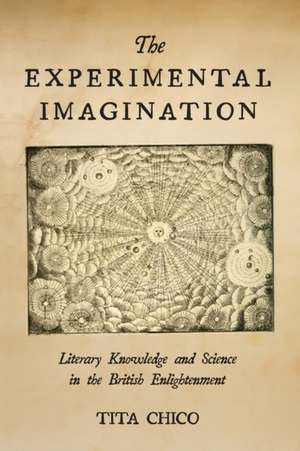The Experimental Imagination – Literary Knowledge and Science in the British Enlightenment
Autor Tita Chicoen Limba Engleză Paperback – 2 mar 2020
| Toate formatele și edițiile | Preț | Express |
|---|---|---|
| Paperback (1) | 230.50 lei 6-8 săpt. | |
| MK – Stanford University Press – 2 mar 2020 | 230.50 lei 6-8 săpt. | |
| Hardback (1) | 703.37 lei 6-8 săpt. | |
| MK – Stanford University Press – 4 iun 2018 | 703.37 lei 6-8 săpt. |
Preț: 230.50 lei
Nou
44.11€ • 47.90$ • 37.05£
Carte tipărită la comandă
Livrare economică 23 aprilie-07 mai
Specificații
ISBN-10: 1503613593
Pagini: 256
Dimensiuni: 151 x 227 x 21 mm
Greutate: 0.48 kg
Editura: MK – Stanford University Press
Cuprins
This introduction challenges the "two cultures" debate about disciplinarity. Critical studies of literature and science have not presented a satisfactory understanding of the two domains' comingling and reciprocity. Early science formulated itself through literary knowledge: natural philosophers relied on literariness not only to present experimental findings but also to imagine the practice of science. The multiplicity and diversity of allusions to science in the long eighteenth-century literary archive reflect an understanding of literary knowledge as epistemologically superior. Natural philosophical practice requires yet obscures the imaginative practice; literary knowledge embraces this impulse as a way of understanding the world at large. The experimental imagination encapsulates the process and effects of literary knowledge as an epistemology. The keywords literary knowledge, science, trope, and gender reveal core concepts that enable myriad writers to posit alternative models of experience, authority, and evidence.
Natural philosophy in the long eighteenth century connoted a sense of modernity and enlightenment, attributes that bound science to meanings in excess of its practice and consumption. The pliancy of science as a trope finds support in reflections on language as a scientific tool by Robert Boyle, Robert Hooke, and other natural philosophers. The two dominant technologies of the experimental imagination are the observed particular and the modest witness. Observed particulars of empirical study are those nuggets of data that disclose themselves and, in their revelation, produce knowledge. The modest witness is the individual who is objective by virtue of erasing himself through his privilege. Tropes are literary tools that not only enable practitioners to describe scientific findings, but also enable an even more fundamental component of experimentalism: literariness makes possible the conceptualization of scientific findings and the individual who produces them.
The character of the immodest witness embodies the self-interest, sexual desire, and circulation of wealth implicitly bound up with the practice of experimental philosophy. The characterization of Gimcracks in Thomas Shadwell's The Virtuoso, James Miller's The Humours of Oxford, and Susannah Centlivre's The Basset-Table and coquettes in Joseph Addison and Richard Steele's The Spectator and Eliza Haywood's The Female Spectator all represent self-interest. In plays and periodicals, characterization, metaphor, and plot together reveal the logic of self-interest undergirding claims to scientific objectivity. If the ideal natural philosopher removed himself to achieve objectivity, then the Gimcrack and coquette were defined by an inability to overcome prejudice and desires, speaking for themselves rather than for the object. For some, this form of bias leads to self-delusion, eroticism, and social obstruction, but for others, it allows a new form of self-directed agency and social, even moral, improvement.
Beginning with Bacon, natural philosophy texts frequently present scientific practice as an erotic quest, establishing a correspondence between sexual seduction and natural philosophical inquiry. Bernard de Fontenelle's and Francesco Algarotti's scientific dialogues, translated by Aphra Behn and Elizabeth Carter, respectively, adopt the literary plot of seduction to explain and promote Cartesianism, Copernicanism, and Newtonianism. Both Behn and Carter embrace the suitability of natural philosophical education for women. For Fontenelle and Algarotti, understanding science necessitates new ways of thinking that are possible only with one's imagination and requires that characters undergo a process of seduction. Learning science is a conversion process, simultaneously rational and affective. Mathematicians, like lovers, are persuasive and persistent, ultimately demanding submission. These scientific dialogues reframe erotic plots to promote intellectual and moral self-improvement, qualities posited as uniquely modern and widely available to the texts' readers.
Late seventeenth-century natural philosophers inherited the conjunction of politics and science at the core of Francis Bacon's experimental project. Thomas Sprat's The History of the Royal Society, Margaret Cavendish's The Blazing World, and Jonathan Swift's Gulliver's Travels use the conventions of literary knowledge to express their scientific-political visions, insisting that natural philosophy cannot be understood apart from the political institutions enabling and enabled by its practice and promulgation. These writers use the experimental imagination to envisage, in turn, civil government, absolutist monarchy, and imperialism. Sprat advances scientific triumphalism and a model for schooling gentlemen into civil society.
The eighteenth-century aesthetic theories of Anthony Ashley Cooper, third earl of Shaftesbury, and Francis Hutcheson use scientific tropes, consequently revealing the reciprocity of scientific and literary epistemologies. Poets use an expressly aesthetic mode to imagine beyond the limits of experimental knowledge, even though eighteenth-century aesthetics takes shape through unacknowledged appropriation of scientific structures and processes. With this reciprocity obscured, natural philosophy may well disclose sights unseen, but poetry does more. In Alexander Pope's The Rape of the Lock, poems inspired by Queen Caroline's homage to British theological and scientific accomplishments in her Richmond Hermitage, and James Thomson's The Seasons, science becomes literature: aesthetic mediations of natural philosophy draw on but also challenge the intellectual work of science, and mount a case for the epistemological superiority of the literary.
